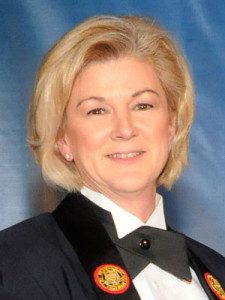Carol-Lynn Chambers is President of Fire Service Women Ontario (FSWO). She is a Section Manager with the Ontario Office of the Fire Marshal & Emergency Management, recently promoted from Operations Manager of the OFM Emergency Preparedness & Response Unit. Carol-Lynn has served in a progression of fire service roles throughout her 27-year career, including Deputy Fire Chief, Firefighter / EMT, Industrial Fire and Hazardous Materials Responder, and interim Chief / Associate Dean of the Lambton College Fire & Public Safety Centre of Excellence.

“…Our membership is growing steadily, as both men and women become aware of our organisation. And yes, we have men as members – enlightened professionals who value diversity and want to work together to instill respect and create a welcoming and supportive environment for qualified women into their fire services…”
Carol-Lynn please can you tell us how long you have been in the fire service?
I have been the fire service for nearly 30 years now. I became interested in a fire service career from a young age, when this was a profession that did not consider women in either a front line or leadership role. My first experience applying was met with “we don’t accept applications from females”.
How did you manage to get the experience you needed in the face of resistance to women in the service?
Knowing the importance of a formal education and the opportunities it could create in terms of promotional advancement, I pursued a Bachelor of Science degree and a Master’s degree in Public Administration.
It was my educational background in science that helped me get into a fire-related field working initially in the private sector, where I gained extensive training and work experience in fire and hazardous materials operational response roles, both in Canada and the United States, and in both career and volunteer roles.
How did you get into leadership roles?
With a continued interest in fire and emergency response and, more specifically in a leadership capacity, my post-graduate education helped give me the opportunity to influence the fire service at a leadership level. I was privileged to serve, at one point in my career, as perhaps the highest ranking female officer in the Ontario (and as I understand it, Canada) fire service as the Deputy Fire Chief in London, Ontario and now in my current role (since 2003) as a senior officer in the Ontario Fire Marshal’s Office.
In 2011-12, I completed a professional development leave of absence where I served as Chief and Associate Dean for the Lambton College School of Fire Sciences / Public Safety in Sarnia. In this role, I had responsibility for launching and managing a $10.5 million new Fire & Public Safety Centre of Excellence, transforming and integrating the firefighter, criminal justice and paramedic training programs into a unique, interdisciplinary learning environment as well as modernising the industrial fire and hazardous materials commercial training programs.
It was there that I noticed the absence of females in the fire program, and started an initiative called “Girls in Gear”. This was where I met a wonderful group of women from the City of Ottawa and that sparked my involvement in Fire Service Women Ontario that has continued ever since.
For the past eight years, I have served as a part-time faculty member in the Local Government program at The University of Western Ontario (Political Science) focused on leadership, management, and organisational behaviour in local government. Many of my students are upwardly mobile fire and emergency service leaders and it is very rewarding to work with them in this academic environment to help develop their leadership acumen.
Can you please tell us about Fire Service Women Ontario and how you became the President?
Fire Service Women Ontario (FSWO) was initially started locally in the City of Ottawa in 2009 and formally incorporated in 2011, becoming the first organisation of its kind in Canada to advocate on behalf of and for women in the fire service.
FSWO was first started by three firefighters in Ottawa who invited me to attend the first conference and annual general meeting as the keynote speaker. The conference was so inspiring, and the positive energy was such that I wanted to become involved and make a contribution. I was honoured and privileged to be asked to become the first inaugural President with a mandate to help lead and expand the organisation from an Ottawa-based membership to more of a provincial focus that would benefit fire services across Ontario.
Fire Service Women Ontario was established to encourage, promote, and advance women in the fire service as well as to inspire positive change and encourage the development of a diverse workforce that benefits fire services across Ontario.
With this mandate in place, my goals were to secure political support at the provincial level, both within government and with key stakeholders such as the Ontario Association of Fire Chiefs and the Ontario Professional Firefighters Association and the Firefighters Association of Ontario (representing volunteer firefighters).
Through these connections and with the support of our entire board, I have had the privilege of leading and helping FSWO build a strong province-wide membership base and establish a sustainable and strong governance infrastructure that will serve and benefit fire services and all of our members in the future.
How many members do you have?
Our membership is currently at about 100 members and is growing steadily, as both men and women become aware of our organisation. And yes, we have men as members – enlightened professionals who value diversity and want to work together to instill respect and create a welcoming and supportive environment for qualified women into their fire services.
We also liaise with the International Women in Fire Service (iWomen) based in the United States; many of our members are also members of iWomen. One of our Directors is a Trustee with iWomen and we had a great contingent of FSWO Directors at their 2014 annual conference in Tucson, Arizona.
What support do you offer your members?
We have established a website (www.fswo.ca) and are actively using social media such as Twitter (@FSWOntario) to exchange current information and network with members and interested parties.
We hold a conference every year and are looking forward to hosting our 4th Conference and Annual General Meeting on November 7-9th 2014 at the City of Hamilton, Ontario’s fire training facility. This three-day event brings in speakers and instructors from across North America and focuses on leadership and professional development including hands on sessions in fire related training exercises.
In addition, we have a mentorship program that provides support and expertise at a variety of venues such as Camp FFIT (Female Firefighters in Training) and Girls in Gear, which is an outreach program hosted by local colleges to encourage high school girls to enrol in emergency response educational programs.
Please can you tell us about Camp FFIT and how this came about?
Camp FFIT started five years ago in Ottawa and is a week-long camp for girls aged 15-18 who may have an interest in pursuing a career as a firefighter. The camp was started after three of Ottawa’s firefighters attended a similar camp that was being held in the state of New York, USA.
Camp FFIT is held at Ottawa’s fire training centre and is led by a group of local firefighters with support from FSWO. The girls are given the opportunity to get hands on experience as a firefighter for that week and learn what they will need to do to be prepared and successful in a future career. This year, two other cities have hosted CampFFIT-style programs with our support and involvement.
The model is being replicated in various different countries now including the US and the UK. How is that working and how does that make you feel?
We are very pleased that our approach is helping to build momentum. This highlights the success of how we are meeting the objectives we set out when we established FSWO. As mentioned earlier, we regularly liaise with other organisations with similar goals, such as I-Women in the U.S.
We also network through social media and other networking platforms on matters of significance where we can highlight our best practices and learn from the best practices of others.
What is next for FSWO?
We will continue to grow our membership base within Ontario, along with cultivating relationships with allied organisations. We can foresee expanding this type of support and professional development network right across Canada as well as abroad, as a means of sharing best practices.
We would like to be able to develop further support tools which could include a more formalised mentoring program, perhaps shorter or even longer versions of Camp FFIT to fit varying needs and to continue to develop collaborative relationships with related organisations.
As FSWO matures and grows, so will the governance infrastructure of the organisation which will put us in a better position to develop model policy positions on key issues related to diversity in the fire service. FSWO hopes to be a key stakeholder and participating organisation that can provide support, advice and guidance to related Boards and government panels to help advance strategic and progressive policy that will benefit both men and women who work in all aspects of fire services across Ontario.
https://twitter.com/FSWOntario





